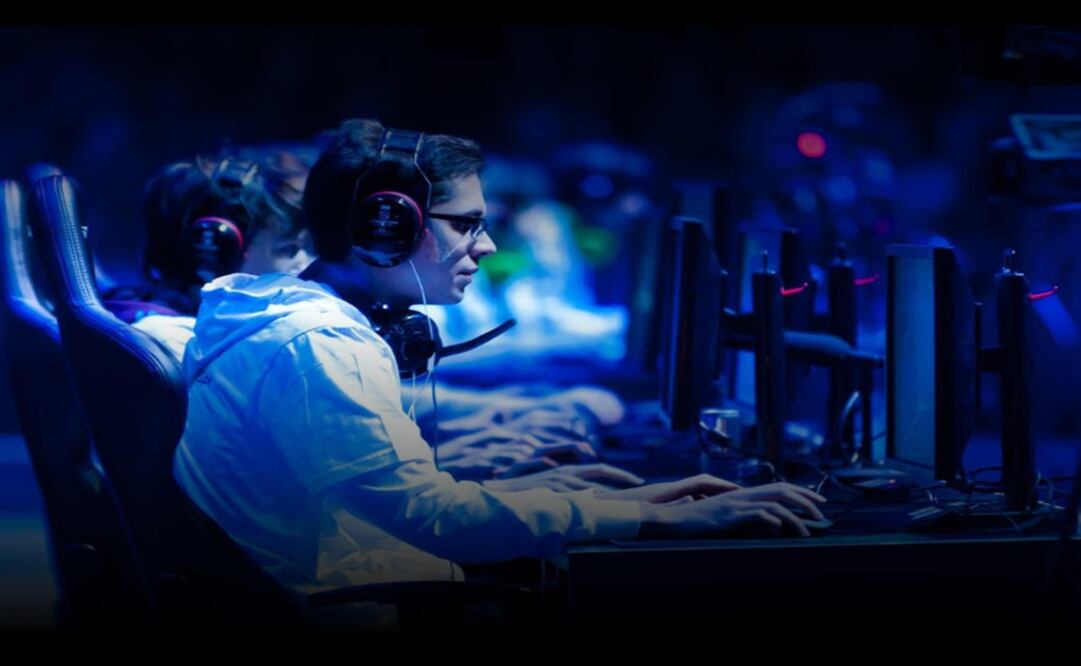Más Información

"El Mencho" surtía fusiles Barretts, AK-47 y AR-15 a sus jefes de plaza; narconómina revela pagos en tecnología y hackers

SRE informa que no hay mexicanos lesionados por ataques de EU e Israel contra Irán; pide permanecer en lugares seguros

Llega a Cuba segundo cargamento de ayuda humanitaria de México a la isla; lleva casi mil 200 toneladas

Defensa va por unidades con máximo blindaje; deben soportar ataques de armas de alto calibre, granadas y explosivos

Suman 13 muertos en dos volcaduras de vehículos en carreteras de Morelos; 10 de las víctimas iban de excursión
Once considered a mere kind of entertainment for children and teenagers, video games have come a long way as a global industry. Worth billions nowadays, video games companies have taken advantage of technological breakthroughs that have helped them evolve from the very first consoles nostalgic gamers must still remember to cutting-edge games with out-of-this-world graphics and VR games that have revolutionized the way users conceive the digital world. With international giants that dominate the industry, is Mexico ready to step up its game?
According to the National Autonomous University of Mexico (UNAM), Mexico is the first consumer of video games in Latin America and the 12th on a global scale. Video games have become increasingly popular in the country and it is estimated that up to half of the population plays them.
Nonetheless, there are still several barriers that prevent the video games industry from blooming in Mexico that are linked to stereotypes and prejudices as well as the lack of investment and technological development, to mention some.
This is not to say Mexico lacks the potential to become a strong referent in the video games world. Our country is known for its talented professionals whose passion and innovation capacities encourage them to face any obstacle to keep contributing to the evolution of different industries, and video games are not the exception.
EL UNIVERSAL in English had the opportunity to talk to Rodrigo Saco, a talented Mexican who ventured into the international video games industry as an independent developer with Dynamic Media Triad, on his experience in the digital world and his perception of Mexico's outlook when it comes to video games.
Recommended:
Global perspective
The video games industry has had an extraordinary growth that is directly linked to technological developments that might have been underestimated when they first came out.
According to Newzoo, the games market is expected to hit USD $159.3 billion in 2020 with as many as 2.7 billion gamers worldwide by the end of the year.
This staggering growth is fueled by markets in regions like Asia-Pacific, the Middle East and Africa, and of course, Latin America.
Moreover, Newzoo adds that these markets are experiencing a growth in their online population, which is driven by improved internet infrastructure, more affordable smartphones, and a growing middle class.
Likewise, the pandemic forced many people to be confined at their homes and they saw in video games a means of escapism, that somehow reminds of the 2018 film Ready Player One, and thus saw video games as an opportunity to have new experiences and keep in touch with friends and family as well as keeping a sense of community thanks to online gaming .
In addition, since the video games industry is constantly evolving, it has been forced to learn how to quickly adapt to the new audience's demands but has also found a way to use existing and successful industries, such as sports, to its advantage.
Recommended:
The rise of esports
When it comes to esports, we are speaking of a worldwide phenomenon with billionaire revenues that is helping break the paradigm of what video games are and who plays them.
Nowadays, esports tournaments attract plenty of gamers of all ages and genders and are one of the fastest-growing video game branches.
According to the Harvard International Review, esports are “video games that are played in a highly organized competitive environment.” This kind of competition involves a whole new kind of athlete whose skills in specific games grant them the chance to compete against the best gamers in the world for large sums of money.
In this vein, Rodrigo Saco added that tournaments in Los Angeles are often sold out and it is quite common to see posters advertising upcoming competitions. In the case of Mexico, he said media has come a long way regarding video games since nationwide media outlets have gone from doing monthly reports on the alleged influence of video games in aggressive behaviors to broadcasting esports competitions and even creating TV channels specifically designed to cover and promote the events.
“In Mexico, the sports culture is making gamers being perceived as what they are: people who simply like video games. They are not the weird stereotype invented in the 90s. A gamer is someone who likes video games, just as someone who likes painting or listening to music. A gamer is a normal person. I think esports are becoming a foundation for video games because a lot of people can empathize with sports.”
In 2019, Mexico founded its Esports Federation and thus recognized the professionalization of esports in the country since the federation is endorsed by the National Sports Commission (CONADE)

The Mexican Esports Federation is in charge of creating a team to represent Mexico in some of the most important international competitions and also organizes national tournaments.
Of course, the decision must have taken into account the significant economic revenue esports are having worldwide. For instance, the Newzoo Global Esports Market Report 2020 mentions global esports revenues will grow to USD $1.1 billion this year and the total esports audience is expected to grow to 495 million people worldwide.
Recommended:
New audiences
As the perception of video games has changed, so has the people who consume them as well as the way they interact with games. According to Newzoo, video games have become an “ever-changing market” that is going through a whole new way of engagement: people are not only playing games, they are also enjoying watching others play them and it is a phenomenon that has become an important part of gaming .
In the past, the prejudice against gamers classified them as young, awkward, often unemployed males, a quite negative stigma that underestimated the potential of the industry as a whole as well as the social contributions video games actually have.
Luckily, this misconception has been changing for a while, although older generations might still stick to the old-fashioned stereotype that could not be more inaccurate nowadays.
For instance, data shows that surprisingly 46% of game enthusiasts in the world are women. Moreover, video games have shown not to be exclusive for children or teenagers since there are more gamers aged 21 to 30 compared to other age ranges. Likewise, the majority of gamers are medium-to-high earners with full-time jobs. So long, 90s stereotype!
Rodrigo Saco adds that quite opposite to what it used to be, gamers are now seen as trendy people with good social skills since now game enthusiasts are known for streaming ; gaming has stopped being an activity done in solitude and has become a social activity in which you connect with a lot of people. “You share pictures or your achievements in social media. You don't play your 200-hour long adventure game by yourself and lose perception of time.” According to the Mexican developer, games have created a sense of community where people go on online adventures, learn from teamwork, make meaningful friendships, and sometimes even find significant others.
“The evolution of the audience and their perception is very positive. In the 90s, video games were an emerging industry. It was until 2011 or 2012 that it gained popularity because it had reportedly surpassed the film industry in economic terms. Now, the video games industry is, by far, more profitable than the combination of the TV, film, and music industries,” said the video games expert and added that new technologies, such as virtual reality, will surely make a huge difference for the industry in years to come.
According to Saco, the future of the video games industry is guaranteed for the next 20 to 30 years thanks to the changes it has experienced in order to evolve and stay ahead of technological developments in areas that involve programming and animation techniques, among others.
In that sense, Mexico has had a slow but steady growth starting with the educational offer that would allow students interested in this area to pursue a serious career. Rodrigo Saco, who is also a programming and games design teacher, works at one of the Mexican universities focused on giving these opportunities to students. He mentions that he tells his students that by knowing how to program a videogame, “they are learning to program a highly complex interactivity box that could malfunction in a thousand ways” however, such a level of complexity, that deals with different physics, for instance, trains them to overcome obstacles that will make any other challenge seem easy as long as they are organized and focus on their work.
Recommended:
How to level up
Mexico has the talent, the innovation capacity, and the growing interest of people not only to play but to develop their own video games.
However, according to Saco, an alternative that could generate stronger foundations for Mexico's video games industry should combine the business factors with people who are truly passionate about this digital world and its legacy but who are willing to innovate and offer authenticity with new high-quality games that become a part of the new identity of contemporary gamers.
Moreover, Mexico should take advantage of the new opportunities generated with the rise of outsourcing, which is not a bad thing per se, for it has given many Mexicans the chance to participate in giant games, such as Halo or more recently The Last of Us Part II, and thus prevent talent drain.“In the end, what will represent you is the quality of your work and your passion, and this is good for Mexico and gives it the chance to keep growing even if it is still not at the point of producing world-famous games due to the lack of investment,” said Saco.
Likewise, having access to the latest technology and a faster internet connection could also help boost Mexico's creative industry since people are actually interested in playing video games. Hence, there has been an increased interest in generating this kind of content in Mexico both for people here and abroad.
Mexican-made video games can certainly be a synonym of high quality, talent, and success which combined with the proper funding and promotion could take Mexico to the next level in the global video games industry .
mp
Noticias según tus intereses
[Publicidad]
[Publicidad]









